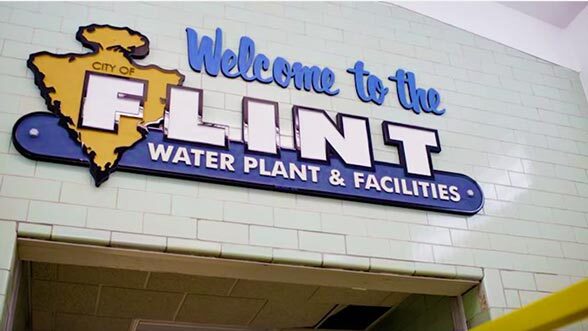University community pulls together to address Flint water crisis
Faculty, staff, and students from all three University of Michigan campuses have been coming together over the water crisis in the city of Flint to offer everything from research expertise and accurate information on the situation to water filters and bottled water.
UM-Flint Chancellor Susan Borrego and Provost Douglas Knerr are leading the coordinated University response.
“We are a campus of problem solvers,” Borrego recently said in a message to the University community. “We are committed to making a difference in our students’ lives and in our community.
“I want you to know that as an institution we are committed to doing whatever it takes to ensure the safety of our students, our faculty, our staff, and our campus visitors. I also want you to know that we recognize that this is far more than a campus issue. We must work to ensure the safety and well being of our community.”
A call to action
Faculty members from all three campuses gathered at UM-Flint Jan. 29 in a collaborative effort to “identify areas of expertise, outline strategies to meet immediate community needs, and propose longer-term solutions to the systemic issues underlying this crisis.”In an invitation sent to dozens of faculty members on the Flint, Dearborn, and Ann Arbor campuses, the U-M provost said, in part:
“The University of Michigan-Flint is issuing a call to action to interested faculty members from all campuses of the University of Michigan to help identify ways in which we can respond to the Flint water crisis.”
Part of that call to action is a commitment by President Mark Schlissel to provide $100,000 in seed funding for University faculty research initiatives to address the Flint water crisis.
Additional efforts
UM-Flint has long been engaged in responding to the water crisis as a key member of the Flint community. All drinking water is filtered on the UM-Flint campus. The University has been testing the water monthly on campus for the past 12 months. View details.
Additionally, there are these efforts, with new initiatives being added:
- UM-Flint is offering a free, open-to-the-public course focused on the Flint water crisis. The class began Jan. 21 and is continuing for seven additional sessions. View details.
- The School of Public Health launched a website devoted to responding to the Flint water crisis with information on experts, partnerships, research, and media coverage. View details.
- Water quality researchers in the College of Engineering are closely watching the unfolding situation with regards to several long-term aspects of the Flint drinking water crisis. View details.
- Michigan News has developed a list of faculty experts on many topics surrounding the Flint water crisis. View details.
- Michigan Radio has been focusing its environmental reporting team on the Flint water crisis. View an archive of that reporting.




Tom Berry - 1973, 1986
What is particularly tragic is that this debacle is the result of the poor leadership and decision-making from an illustrious alum, the Governor.
Reply
John Jay - 1966
From press reports, it seems that the University at Flint was reactive, not proactive, in this crisis. The water was brown and the University provided filters for its own water supply, but what, if anything, can the University take credit for in terms of alerting Flint to the problem in the first place? Wouldn’t one expect that warning flags like discolored water and the need to filter might lead the University to initiate a warning response early on? No such proactive response has been reported that I have seen.
I agree with the other poster that this brings shame on the Governor, a UM alumnus.
Reply
Tom Ivacko - 1986, 1993
The Center for Local, State, and Urban Policy (CLOSUP) at the Ford School of Public Policy will also be doing research on water issues across the state as part of the Michigan Public Policy Survey of local government leaders. A battery of questions on water provision, water governance, problems and challenges, willingness to pay for improvements, etc., will be included in the spring 2016 MPPS survey, to learn more about these issues in hundreds of communities across Michigan.
Reply
William Deubel - 1972
How could any UM alum be surprised that the Governor would seek knowledge from only his chosen experts? Perhaps a few of us have discovered the novel and are able to share that joy by helping others think without predetermining how. We can learn to laugh at how little we know without finding scapegoats for the inferiority of our own knowledge.
Reply